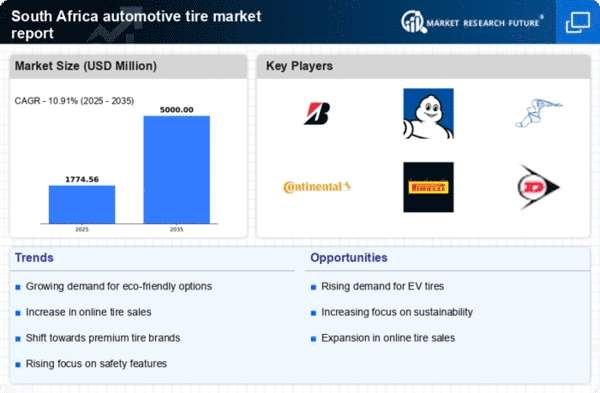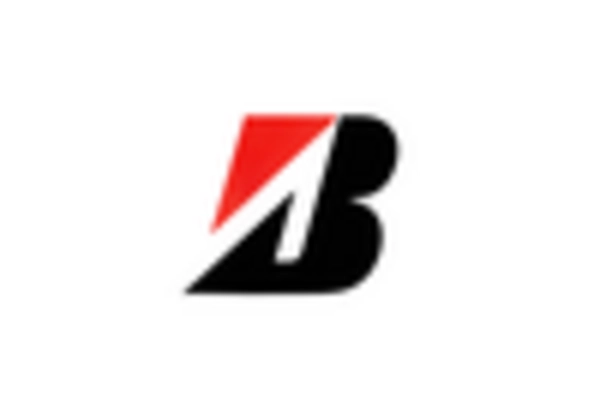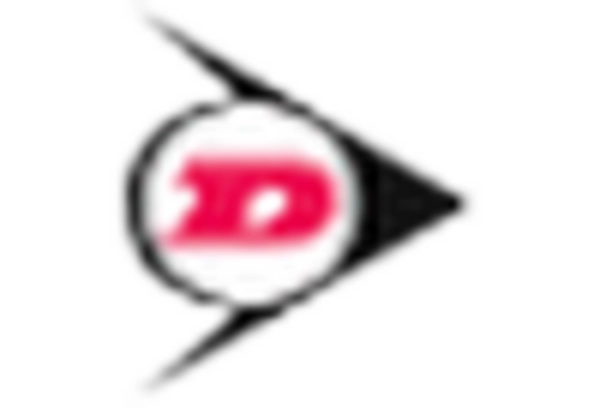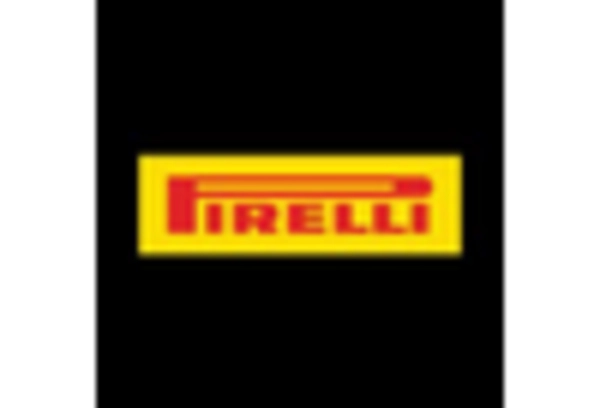Rising Vehicle Ownership
The automotive tire market in South Africa is experiencing growth due to the increasing vehicle ownership rates. As more individuals acquire vehicles, the demand for tires naturally escalates. Recent data indicates that vehicle ownership in South Africa has risen by approximately 5% annually, leading to a corresponding increase in tire sales. This trend is further fueled by the expanding middle class, which is more inclined to invest in personal transportation. Consequently, the automotive tire market is likely to benefit from this upward trajectory in vehicle registrations, as each new vehicle requires a set of tires. Additionally, the growing preference for personal vehicles over public transport, driven by safety and convenience concerns, is expected to sustain this demand in the foreseeable future.
Infrastructure Development
Infrastructure development plays a pivotal role in shaping the automotive tire market in South Africa. The government has been investing significantly in road construction and maintenance, which directly influences tire performance and longevity. Improved road conditions reduce wear and tear on tires, thereby increasing their lifespan and encouraging consumers to purchase higher-quality options. According to recent reports, the South African government allocated approximately $1 billion for road infrastructure projects in 2025, which is anticipated to enhance the overall driving experience. This investment not only supports the automotive sector but also stimulates the tire market, as consumers seek tires that can withstand varying road conditions. As infrastructure continues to develop, the automotive tire market is likely to see a surge in demand for durable and high-performance tires.
Shift Towards Performance Tires
The automotive tire market in South Africa is witnessing a notable shift towards performance tires, driven by consumer preferences for enhanced driving experiences. As more drivers seek improved handling, traction, and safety, the demand for high-performance tires is on the rise. Recent market analysis suggests that performance tires account for approximately 30% of total tire sales in the region, reflecting a growing trend among consumers who prioritize quality and performance over cost. This shift is further supported by the increasing popularity of sports and luxury vehicles, which often come equipped with specialized tires. Consequently, manufacturers are likely to focus on developing innovative tire technologies that cater to this segment, thereby propelling the automotive tire market forward.
Growth of E-Commerce in Tire Sales
The rise of e-commerce is transforming the automotive tire market in South Africa, providing consumers with greater access to a variety of tire options. Online platforms are increasingly becoming popular for purchasing tires, as they offer convenience and competitive pricing. Recent statistics indicate that online tire sales have grown by approximately 20% in the past year, reflecting a shift in consumer buying behavior. This trend is particularly appealing to tech-savvy consumers who prefer the ease of shopping from home. As e-commerce continues to expand, tire retailers are likely to enhance their online presence, offering detailed product information and customer reviews. This evolution in the retail landscape is expected to further stimulate the automotive tire market, as consumers increasingly turn to online channels for their tire needs.
Regulatory Compliance and Safety Standards
Regulatory compliance and safety standards are becoming increasingly stringent in South Africa, significantly impacting the automotive tire market. The government has implemented various regulations aimed at ensuring tire safety and environmental sustainability. For instance, the introduction of mandatory tire labeling and performance standards has compelled manufacturers to enhance their product offerings. This regulatory landscape not only promotes consumer safety but also drives innovation within the automotive tire market. As manufacturers adapt to these regulations, there is a growing emphasis on producing tires that meet safety requirements while also being environmentally friendly. This shift is likely to create opportunities for companies that invest in research and development, ultimately benefiting the automotive tire market.

















